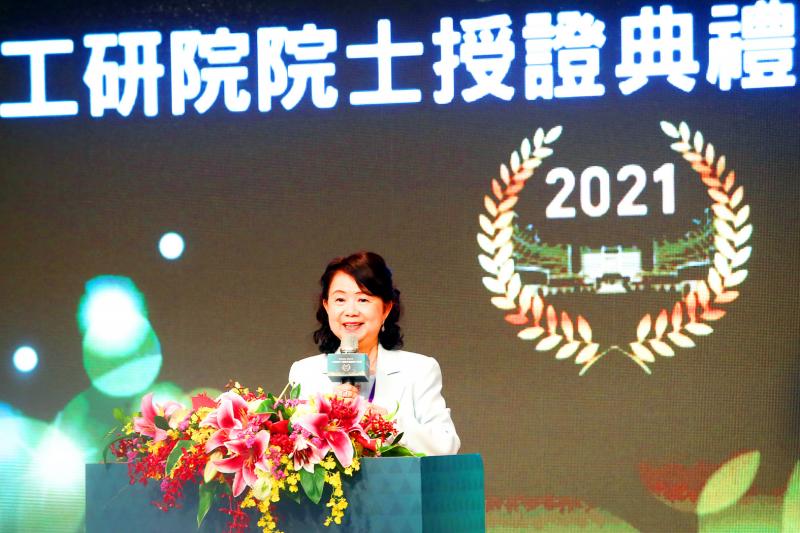PharmaEngine Inc (智擎生技) founder Grace Yeh (葉常菁) has become the Industrial Technology Research Institute’s (ITRI, 工業技術研究院) first female fellow since it started awarding business leaders with fellowships 10 years ago.
ITRI chairman Lee Chih-kung (李世光) told the 10th ITRI Laureates award ceremony on Tuesday that Yeh’s induction was significant, because in addition to being the institute’s 50th laureate, she is its first female fellow.
Yeh said she was surprised to learn that she was the first woman to be awarded.

Photo: CNA
Taiwan has many outstanding female leaders in the field of technology, but they have so far been ignored by the laureate selection committee, Yeh said, urging ITRI and other institutions to broaden their perspective.
Although women are not necessarily stronger than men, they help make society more diverse, she said.
“Woman usually have different thoughts and backgrounds, which help them be more tolerant,” she said.
Yeh thanked her parents and her husband for their support and encouragement.
She also thanked Center Laboratories Inc (晟德大藥廠) chairman Lin Rong-jin (林榮錦) for persuading her to come back to Taiwan and in 2003 establish PharmaEngine, a Taipei-based biopharmaceutical company that develops cancer treatments.
Yeh said that after she stepped down as president and CEO of the firm in 2019, she moved to Switzerland to set up Onward Therapeutics SA, a developer of hematological and solid tumor drugs.
Although her core business is now in Europe, Yeh also serves as vice chairwoman of the Taiwan Bio Industry Organization (台灣生物產業協會).
She hopes that her involvement will help make Taiwan’s biotechnology industry more international, Yeh said.
As a businesswoman, she hopes to direct more attention to gender equity so that more female ITRI fellows would be selected, she said.
Yeh received her doctorate in immunology from the Medical University of South Carolina.
At the helm of PharmaEngine, Yeh created and adopted the “no research, development only” and “networked pharma” business models for drug developers.
At the time of the firm’s foundation, the first model was particularly suitable for Taiwanese biotech companies, which were mostly at an early growth stage and had limited access to capital, therefore having limited resources for research and marketing.
Under the “networked pharma” model, firms outsource drug development processes to contract manufacturers and research organizations for new drug development.
Using this model, PharmaEngine developed two drugs — Onivyde for treating pancreatic cancer and PEP503, a novel radio-enhancer for the treatment of soft tissue sarcoma.
Onivyde was in 2015 approved by the US Food and Drug Administration for intravenous use as part of a first-line combination for the treatment of advanced pancreatic cancer. It was the first cancer drug developed in Taiwan to receive US approval.
PharmaEngine, which entered the local over-the-counter stock market in 2012, reached a capitalization of more than NT$30 billion (US$1.08 billion at the current exchange rate) after the approval.
At the time, the firm only had 22 employees so that each one of them was worth NT$1.4 billion, Yeh said, highlighting the profitability of the sector.

KEEPING UP: The acquisition of a cleanroom in Taiwan would enable Micron to increase production in a market where demand continues to outpace supply, a Micron official said Micron Technology Inc has signed a letter of intent to buy a fabrication site in Taiwan from Powerchip Semiconductor Manufacturing Corp (力積電) for US$1.8 billion to expand its production of memory chips. Micron would take control of the P5 site in Miaoli County’s Tongluo Township (銅鑼) and plans to ramp up DRAM production in phases after the transaction closes in the second quarter, the company said in a statement on Saturday. The acquisition includes an existing 12 inch fab cleanroom of 27,871m2 and would further position Micron to address growing global demand for memory solutions, the company said. Micron expects the transaction to

Vincent Wei led fellow Singaporean farmers around an empty Malaysian plot, laying out plans for a greenhouse and rows of leafy vegetables. What he pitched was not just space for crops, but a lifeline for growers struggling to make ends meet in a city-state with high prices and little vacant land. The future agriculture hub is part of a joint special economic zone launched last year by the two neighbors, expected to cost US$123 million and produce 10,000 tonnes of fresh produce annually. It is attracting Singaporean farmers with promises of cheaper land, labor and energy just over the border.

US actor Matthew McConaughey has filed recordings of his image and voice with US patent authorities to protect them from unauthorized usage by artificial intelligence (AI) platforms, a representative said earlier this week. Several video clips and audio recordings were registered by the commercial arm of the Just Keep Livin’ Foundation, a non-profit created by the Oscar-winning actor and his wife, Camila, according to the US Patent and Trademark Office database. Many artists are increasingly concerned about the uncontrolled use of their image via generative AI since the rollout of ChatGPT and other AI-powered tools. Several US states have adopted

A proposed billionaires’ tax in California has ignited a political uproar in Silicon Valley, with tech titans threatening to leave the state while California Governor Gavin Newsom of the Democratic Party maneuvers to defeat a levy that he fears would lead to an exodus of wealth. A technology mecca, California has more billionaires than any other US state — a few hundred, by some estimates. About half its personal income tax revenue, a financial backbone in the nearly US$350 billion budget, comes from the top 1 percent of earners. A large healthcare union is attempting to place a proposal before